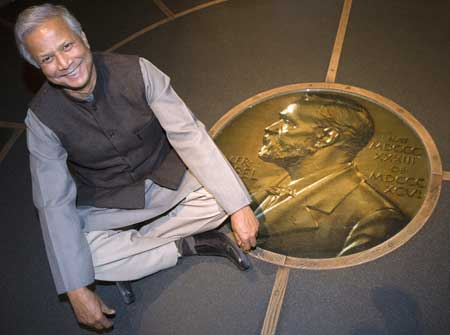Muhammad Yunus – Banker to the poor
Muhammad Yunus has lifted millions out of poverty, but he is not resting on his laurels. Social business is next on his agenda.
Muhammad Yunus has lifted millions out of poverty, but he is not resting on his laurels. Social business is next on his agenda.
Bangladesh economistMuhammad Yunus, founder and director of Grameen Bank and joint winner, with the bank, of the Nobel Peace Prize for 2006, has inaug-urated a new venture: social business.
Yunus’ work toward economic change began in 1974 when he visited the villages around Chittagong University where he taught economics. It was during a period of great famine, and, recalls Yunus, “I found that the grand theories that I taught in the classroom had no meaning in the lives of the people.”
Convinced that he was teaching “make-believe stor-ies” to his students, he turned away from textbooks and toward the villagers themselves in order to better understand their lives. What he found was that people were starving for lack of access to small amounts of money. For example, there was a woman who wanted to make bamboo stools to earn a livelihood, but she lacked the 25 US cents needed to buy the bamboo. Yunus identified 42 such people, who needed as a group a total of only 27 US dollars to keep starvation at bay. He lent them the money (long since repaid), but he failed to get bank linkage to poor villagers as they had no collateral to give as security.
Thus, in 1976, the Grameen Bank concept was developed to create a banking system based on mutual trust, accountability, innovation and group dynamics. Thus far it has provided microcredit to 6.7 million women from 72,000 Bangladesh villages.
However, it has been an uphill task for this “banker to the poor” to convince economists that microcredit should be taken seriously. The Nobel Peace Prize has brought with it important recognition. “It was difficult to get their attention for the work we’ve done so far, because they didn’t think it was of any great consequence,” says Yunus. “But with the Nobel, doors immediately got opened, and we have become more acceptable, audible.”
All of Bangladesh celebratedthe news of the Nobel Prize. It was an important “first” for the country. The Nobel cited Yunus for developing microcredit into “an ever more important instrument in the struggle against poverty alleviation programmes.” To date the Grameen microcredit model has been replicated in more than 100 countries, with financial and technical support from Grameen Bank.
In Bangladesh, Grameen has grown from its tiny origins into a huge conglomerate (Grameen Phone is the biggest mobile phone operator in Bangladesh, with 10 million subscribers, for example), but Muhammad Yunus, who lives in Dhaka, the Bangladesh capital, keeps things simple. At his office at the Grameen headquarters in Dhaka, the air conditioning is not on, nor are you offered milk with your tea. “I’m the custodian of poor women’s money and trust, and milk costs a lot of money,” he once said, and that has not changed.
But one thinghe isn’t short on is time for the Grameen women. A reception hosting the Bangladesh President Iajuddin Ahmed was telecast on national television. Afterwards his mobile didn’t stop ringing. Most of the callers were Grameen women. “They have my number,” says Yunus.
Now that he has proved that poor women are trustworthy, has set up several development-oriented businesses, and has helped millions come out of poverty – what next?
“Social business enterprise,” Yunus says. “I want to prove that business does not always have to be for profit maximization, a vehicle for making money. The human being is more than just a profit-making machine.”
The concept is that instead of giving away money as charity, it could be invested in a venture to serve poor people’s nutrition or health-care needs. Run efficiently and with integrity, any business can make a profit, but the profit, instead of being returned to the investor as dividends would be ploughed back into the company to extend its reach.
“I’m re-defining some economic concepts and creating another category of business – the business to do good to people,” says Yunus. “Profit is not why I do business; I do it because it touches people’s lives and helps people.”
One such venture between Grameen Bank and the French major food group Danone – Grameen-Danone Foods – will provide micronutrient-packed yoghurt to malnourished children in Bangladesh. The project was conceived in November 2005 when Danone CEO and President Franck Riboud invited Yunus to lunch in a Paris restaurant. “He wanted to understand what Grameen Bank was all about,” recalls Yunus. “So I explained and said ‘Why don’t we create a Grameen-Danone company in Bangladesh?’”
“It’s two years later, and the yoghurt turned out by the JV’s dairy in Bogra, 220 kilometres from Dhaka, is feeding children in the surrounding villages. Fifty such dairies are planned over a 10-year period. “Now I can convince others that if Danone can do it, it’s not that wild a business idea,” says Yunus, grinning.


